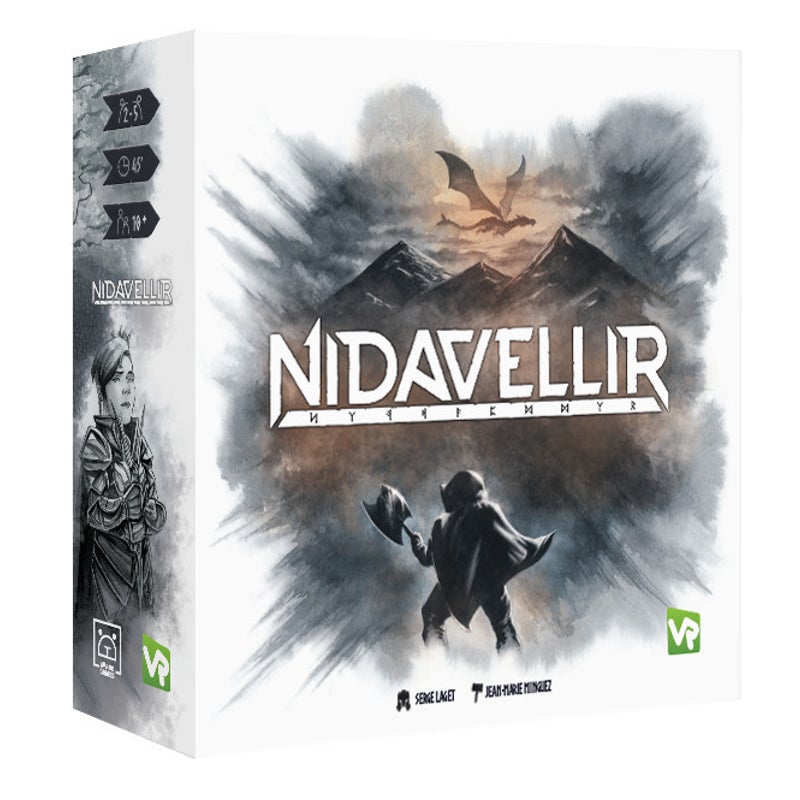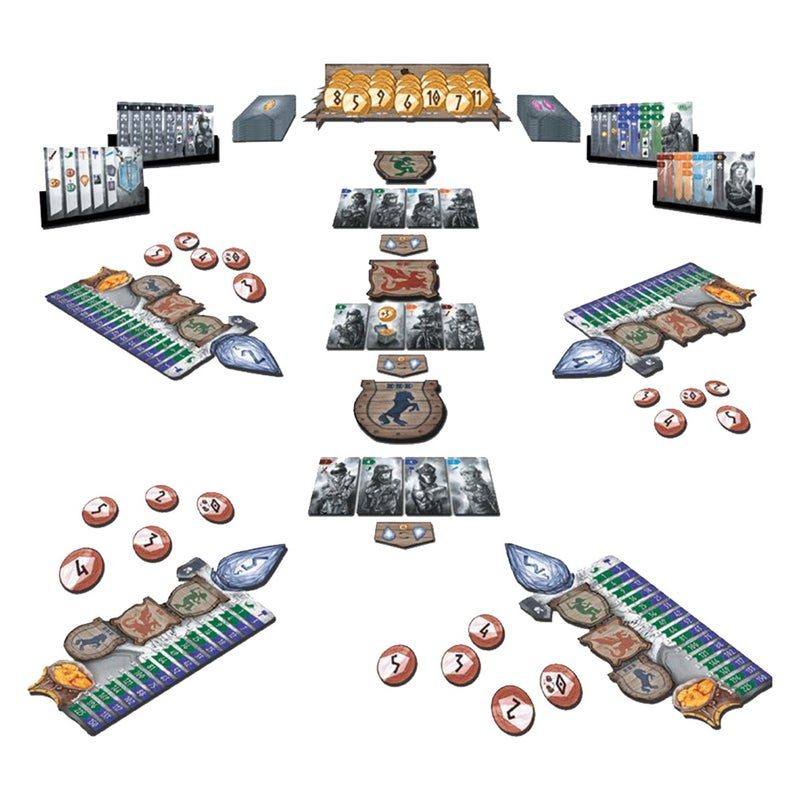
I've written a few of these articles, and at long last I get to talk about D&D! I am, of course, talking about Drafting and Dwarves.
Nidavellir is a set-coll ection card game where players bid for the first pick of the best heroes. It doesn't look like much, but within this unassuming white box is a compelling cocktail of cards and coins. It's simple enough to be accessible to non-gamers, but rich enough to offer a variety of means to score big points, lending to its high replayability.
ection card game where players bid for the first pick of the best heroes. It doesn't look like much, but within this unassuming white box is a compelling cocktail of cards and coins. It's simple enough to be accessible to non-gamers, but rich enough to offer a variety of means to score big points, lending to its high replayability.
In a game of Nidavellir, players are given gem tokens (to break ties) and five gold coins valued at 0, 2, 3, 4, and 5. At the start of the game, we'll set up three taverns (i.e. the groups of cards we'll be bidding for), a bank of coins, and a set of legendary dwarven heroes we may get the chance to recruit. It's during this phase that you might encounter Nidavellir's one and only problem - the rulebook. The rulebook is poorly translated, poorly formatted, and convolutes what is otherwise a very straightforward game. But please - for the love of Moradin PLEASE - vault this hurdle. This game is worth it. When learning to play, I recommend looking up a tutorial on YouTube (I used this one).

Playing the game is incredibly easy. At the start of each round, players will secretly bid one coin on each of the taverns, thus having three coins bid and holding two in reserve. One tavern at a time, players simultaneously reveal their bets, and whoever bid the highest gets to draft the first dwarf. Whoever bid the second-highest picks the second dwarf, and so on. A few clever little things happen here: If players have bid the same value coin, the tie is broken by the player with the highest value gem. Once drafting for that tavern is done, the tied players will exchange gems, so that the player who picked last this time has a better chance of picking first next time. Another thing to keep in mind is that during bidding, you use your 0 coin to invest in your future. By bidding 0, you can swap out one of the coins you have in reserve for a coin of higher value from the bank, so that next time around you'll have more buying power. Both of these elements are small things, but they go a long way in making the game feel even.
Once the taverns have been emptied, we refill them with dwarves, take our coins back, and start bidding again. "But what about the dwarves we're bidding on?" I hear you ask. "You've told us about the drafting. Tell us more about the dwarves!" Oh, dear reader, how could I deny you what you so dearly wish?
 The dwarves in the game come in five suits, each having a different method by which they're scored. No matter the suit, the more you have, the better you'll do. But it'll be up to you whether you go all in on one, or try to get an even spread of all. Thankfully, the game rewards players for doing either - or both! Each time a player gets one of each suit of dwarf, they're rewarded with one of those legendary heroes I spoke of earlier. These guys can be worth big points, they can be used as wild cards, they can do a whole bunch of cool stuff. (The Dwergs, for example, are quintuplets, and are worth big points if you can get them all). Additionally, halfway through the game, players will be rewarded if they have majority in any particular suit. Want a gem that's super valuable and can never be exchanged? Want a 0 coin that's actually worth 3? Some rewards are generically good, while you'll get more mileage out of others depending on what game you're playing.
The dwarves in the game come in five suits, each having a different method by which they're scored. No matter the suit, the more you have, the better you'll do. But it'll be up to you whether you go all in on one, or try to get an even spread of all. Thankfully, the game rewards players for doing either - or both! Each time a player gets one of each suit of dwarf, they're rewarded with one of those legendary heroes I spoke of earlier. These guys can be worth big points, they can be used as wild cards, they can do a whole bunch of cool stuff. (The Dwergs, for example, are quintuplets, and are worth big points if you can get them all). Additionally, halfway through the game, players will be rewarded if they have majority in any particular suit. Want a gem that's super valuable and can never be exchanged? Want a 0 coin that's actually worth 3? Some rewards are generically good, while you'll get more mileage out of others depending on what game you're playing.
And that's something I love about Nidavellir. It asks the question, "What type of game are you playing?" and not only does it allow you to play that game, it rewards you for playing it. Being rewarded in this game feels great, and while the rewards give us points or powers they're not so huge that the player who maybe isn't doing too well feels even more defeated. That said, every game of Nidavellir that I've played has been surprisingly tight, even if it didn't look like it. Which kind of serves a testament to how well-balanced the game is (at least, in my experience).
The game ends when we've run out of cards to bid for. The victor is the player with the most points, and the army they've drafted gets the honour of fighting the mighty dragon Fafnir! (You don't actually get to fight the dragon in-game, but presumably it goes well.)
To round it out, Nidavellir ticks all the boxes I want from this style of game. The bidding and set collection is fun, I care about the decisions I need to make, I'll be rewarded for playing the way I want to, and the game feels fair. And after a game, it's so easy to just shuffle the cards up, get your starting coins back and just play again. It's joyful, and it has me wanting more. To me, that's the mark of a great game.





